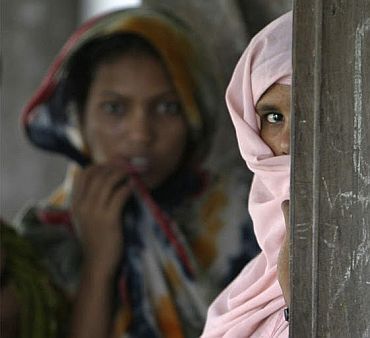 How the BJP’s politics plays out at the grass-roots level will determine its relationship with Muslims in the near future, says Sajid Bhombal
How the BJP’s politics plays out at the grass-roots level will determine its relationship with Muslims in the near future, says Sajid Bhombal
During every election in India we have seen different issues dominating the campaign. However, one issue it seems is constant. The Muslims!
Approximately 12-15 per cent of the population, the community’s votes are quite important to all political parties and each of them has its own way to lure the community.
The Muslims are not a homogeneous group. Muslim votes go to various parties in India, including the Bharatiya Janata Party -- even the Shiv Sena for that matter. The percentages may vary, depending on the geographical location or the ideology of the party in question. The Congress still gets more of the community’s votes simply because the party still has the largest presence across India.
Nevertheless, the community is constantly charged with voting en bloc and that they vote largely on the basis of what their religious/community leaders direct them to.
For this to be true there must be a strong central leadership of the community existing. And there is none.
So why is this perception of the community widely accepted as a fact? One reason is that Muslims do not enthusiastically vote the BJP. This leads to another widely believed perception that Muslims vote strategically with only one aim -- to defeat the BJP at the hustings.
For this to be true, there must not only be a strong central leadership of the community existing but that leadership must also be so politically savvy that it has a detailed knowledge of voting patterns and demographics of each and every constituency across India – or at least most of them. This is something even our national political parties do not seem to possess, so how come some vague, imaginary Muslim central leadership can have it?
It is of course absolutely possible that on a local level the community leadership may have strategies where they put in an effort to see that those they see as hostile elements are defeated. But my point is – you cannot conclude from this that there is some grand national-level Muslim strategy to defeat the BJP.
However, to repeat what I said, what is true across the country is that Muslims do not enthusiastically vote for the BJP.
This wouldn’t have made any significant difference, or merited headlines and newsprint space if the BJP was just another marginal party, but it is not; the BJP is the only alternative to the Congress at the national level.
At a time when the nation is struggling to find a viable alternative to a discredited government, the BJP’s Muslim issue -- or the Muslims’ BJP issue (whichever way you look at it) -- assumes significance.
There is a realisation among the BJP leadership that if the party has to really claim the top spot in national politics, it cannot simply ignore the largest minority in the land. That much is quite clear. Even Gujarat Chief Minister Narendra Modi realised it after flirting with the idea of ignoring the Muslims and consolidating the Hindu votes. Breaking his pattern of ignoring the community, he engaged with it last weekend in Ahmedabad – you can read here what one of the community representatives told him during the interaction.
The question for the BJP is how to go about winning over the Muslims.
In this respect, recently, Offstumped, a popular blogger, wrote an open letter addressed to ‘Dear Indian citizen of minority persuasion’ in which he suggested a preamble to the BJP’s possible vision document on minority empowerment.
This is what he wrote:
‘Dear Indian citizen of a minority religious persuasion
‘Please do not vote for the BJP.
‘To be clear and unambiguous, we would like to emphasise that you not voting for the BJP is perfectly all right with us. We welcome and respect that decision of yours.
‘Even as you don’t vote for the BJP, it is our earnest appeal to you that please don’t vote against us out of fear.’
Though I do not doubt Offstumped’s intentions, I find it amusing that he chose to begin the preamble on a negative note. The underlying assumption in the beginning itself is that Muslims somehow fear the BJP and that is why they vote against it.
Could it be that Muslims simply vote for the parties which reach out to them more than the BJP does?
Offstumped writes further:
‘For far too long you have been conditioned, compelled and manipulated into voting in a certain way out of fear. For far too long you have allowed collective paranoia to force you to vote with an ‘under siege’ mindset. For far too long you have allowed cynical opportunists to benefit from your vote by default.’
Even though I do agree that cynical opportunists have benefited from the Muslim vote by default, I find it unfair that the whole community should be projected as ‘conditioned, compelled and manipulated’.
Can we turn the argument around by180 degrees and say that it actually is a failure of the BJP to reach out to Muslims which has resulted in other parties cynically exploiting Muslim votes?
And then Offstumped says this:
‘If you have to not vote for us, let it at least be a vote for your interests rather than a vote against the BJP. Let it at least be a vote where you put your socio-economic interests above everything else. Let it at least be a vote where identity-based paranoia and victimhood has no role to play’.
Again, the underlying assumption here is that Muslims as a whole do not vote for their own interests but vote against the BJP.
In short, Offstumped’s suggested preamble to the vision document on minority empowerment is based on the premise of saying the divide exists, and it exists because Muslims are foolish to fall prey to the manipulation by cynical opportunists.
This is not how you win hearts.
Though nothing is one-sided; the onus to win votes lies on the political parties and not voters. Though well-intentioned, this is where I found Offstumped’s preamble lacking.
The BJP needs to reach out to Muslims and, to be fair, they realise that. But in the process the BJP needs to realise that Muslims are not a homogeneous group.
For years the BJP has projected the community as the ‘other’ to consolidate its Hindu core vote bank. That may have helped the BJP to a certain extent, but not enough for it to get to a level where it can claim to be the natural party of governance.
But the BJP is a big national player. The wider political options in India are now represented by the Congress-led dispensation on the one side and the BJP-led one on the other. This is not going to change in the foreseeable future. Muslims cannot wish away the BJP, and the BJP cannot ignore them either.
Though a broad vision document on minority empowerment may help set the positive atmospherics at the national level, the more important factor is how the BJP’s politics plays out at the grass-root level which will determine the BJP-Muslim relationship in the near future.
Politics is local, all politics is. And whenever the BJP has reached out to Muslims on a local level it has found support. In the 1980s Kusumtai Abhyankar, one of the first BJP MLAs in Maharashtra, won from Ratnagiri constituency with a sizeable Muslim support. Bal Mane, a former MLA and now an office-bearer of the Maharashtra BJP has, I dare say, a solid Muslim vote bank.
And when Narendra Modi changed his strategy and realised that he indeed needs to reach out, smart politician that he is, he started from the local elections in Gujarat. And it worked.
This is where the BJP should concentrate on, rather than treating Muslims as a homogeneous group which has nothing else to do but vote against the BJP.
It is going to be a long process given the years of hostility, but a beginning has to be made. Is the BJP up to it?
We will know in the coming months.
Sajid Bhombal writes an occasional political column for Rediff.com. He can be contacted at sajidbhombal@hotmail.com











 © 2025
© 2025